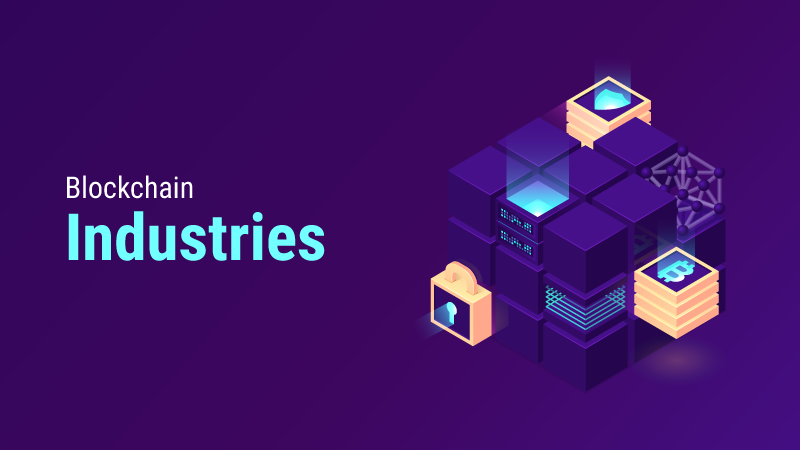Industries That Blockchain Will Transform

In order to sustain continuous growth in the business sector, many organizations are striving to adapt to a new and different environment that is having essential collaboration and optimization. Many industries find blockchain technology a better option than any procedures existing in the current businesses for finishing key components of work. Bitcoin’s popularity helped demonstrate the application of blockchain in the finance sector, but this indirectly made the entrepreneurs realize that tech could bring immense changes in many more industries. Companies using blockchain to drive higher accuracy and transparency throughout the digital information platforms started building technological awareness in different sectors starting from infrastructure to public policy.
Here, in this article, let us try to discuss different industries transformed by blockchain.
Blockchain Industries
There are many industries where blockchain plays an important part in driving economic and infrastructure growth. Great ideas are not just enough to achieve success in blockchain. You must know how to use blockchain technology in your business to enable transformation. Let us discuss some of the major use cases of blockchain technology in different industries:
Banking
Banking processes are always time-consuming and expensive, and it doesn’t guarantee you 100 percent security as well. Blockchain makes a radical change and interrupts the commercial banking system by offering a smooth system for transactions at a lower cost and with greater security. It also puts an end to the requirement for a third party to initiate a transaction which in turn reduces the processing time to a greater extent. Though blockchain consists of a string of transactions linked in a specific order, the digital ledger can be shared across a computer network by all parties involved, without any centralized authority or intermediary. This gives you complete autonomy throughout your transaction. Since blockchain ledgers are digitized, safe, and secure, they can provide the same function, giving better information sharing and precision in the financial service environment.
Cybersecurity
In the current digital world, cyber-attacks are the biggest threat and blockchain can protect our data from unauthorized access and fraud. All information recorded on Bitcoin or any other blockchain network is verified and encrypted using a cryptographic algorithm that prevents widespread attacks through any single point of entry. Additionally, with blockchain, you can easily detect harmful data attacks caused as a result of peer-to-peer transactions in which the data can neither be altered nor manipulated. Furthermore, by avoiding a central authority while initiating transactions, blockchain offers a safe and transparent way to record transactions by not disclosing any personal information.
Healthcare
When it comes to data sharing, healthcare organizations face the inability to transfer data across multiple platforms securely. Securing the medical information of patients is more important than anything in healthcare, and in such cases, blockchain technology makes the most sense. In blockchain technology, Blocks are connected with each other and distributed throughout the blockchain nodes. Therefore, making it difficult for an infiltrator to corrupt the data. Collaboration of data should be efficient between providers in order to make precise diagnoses, less expensive care, and effective treatments. Using blockchain in the healthcare sector enables hospitals, pharmacies, and other healthcare-related chains to have shared access to the common network with no compromise on the safety and integrity of data. Another important concern in the healthcare sector is regarding fraudulent medicines, which can also be controlled by blockchain technology. The problem lies in differentiating counterfeit drugs from the real ones. This issue is resolved by blockchain technology using supply chain management protocols that can trace the origin of the drug.
Government
Public management service is another sector where blockchain helps to reduce paper-based processes, eliminate fraud, and boost accountability among officials and whoever they serve. Many governments have chosen blockchain technology in their administration to recognize the benefits of using it. One of the best examples is the use of blockchain by the Swedish Land Registry in registration to prevent fraud and reduce disputes regarding ownership. It also tested the use of smart contracts to sell any property.
Blockchain also plays an important role during voting. In conventional voting, people cast their votes one by one, standing in a line or via mail. This is counted by the voting authority. There is a provision of online voting also but all of these may result in fraud. Using blockchain technology, people can vote without disclosing their identity. With blockchain, officials who know that only a single vote can be attributed to each ID can count the votes with great accuracy. Fraud is not possible with blockchain technology because once a vote has been added to a ledger, there is no way to change or erase it.
Supply chain management
In most situations, supply chain data is invisible, unavailable, or unreliable. Blockchain enables distribution network partners to share reliable data through licensed blockchain solutions. This is very relevant, especially during times of trouble. Businesses and customers need brands to ensure the legitimacy of the product while participants in the distribution network ask for responsible sourcing and good visibility to reduce disputes. Blockchain for supply chain management enables leaders to use data to manage current barriers and build flexibility for the future.
Wrap Up
Blockchain technology has emerged for a couple of years, and industries are yet to explore many new methods to apply the technology to perform various operations. As the use of digital data in our lives has increased, the need for blockchain data security, access, transparency, and integrity has spiked to a greater level. Such applications of blockchain technology simply indicate the beginning and many businesses are awaiting the potential possibilities blockchain technology is about to bring to the world. However, most of the promised projects still lie in the initial stage of development, and it may take years for them to come into widespread use. It is clearly visible that blockchain technology is ready to work in the way we operate. Becoming an expert in blockchain now secures your future in the industry of your choice. Blockchain provides a general understanding of the basics, from the origins of blockchain technology to Bitcoin data structures.
Get Started with our Blockchain Consulting ServicesBlogs by Category
AppForms Artificial Intelligence Blockchain Call Centers Chatbots Cloud Computing Data Management Design Digital Marketing Digital Transformation Enterprise Applications FinTech Insights LowCode Development Microsoft Mobile Apps News Office 365 Robotic Process Automation Security SharePoint Software Development Web ApplicationApplications of Blockchain Technology in the Healthcare Industry

2024-05-27 13:12:47